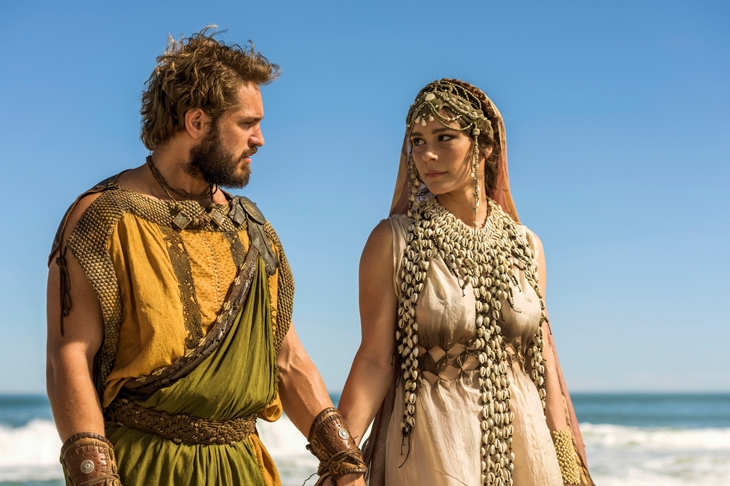ITV’s Marcella (Monday) represents another triumphant breakthrough in the portrayal of female cops on television. Of course, thanks to more or less every other crime show around, we already know that women in their forties can be senior police officers. But what Marcella makes even clearer than, say, Vera or No Offence is that so can women in their forties who are entirely unsuited to being senior police officers.
For a start, the eponymous heroine suffers from regular mental collapses during which she often turns violent before handily forgetting — and forgiving herself for — anything bad she may have done. She also seems to specialise in cases where she hasa deep personal involvement that might cause a lesser woman to worry about a conflict of interests.
In this new series, for example, the body of a murdered nine-year-old was discovered behind the wall of a London flat. Despite the corpse being in an advanced state of decay, Marcella (Anna Friel, acting her socks off throughout — and in one scene her pants) immediately recognised the victim as her son Edward’s friend Leo, who’d disappeared in 2014. Not only that, but Leo’s mother blamed Edward for the disappearance, as he’d promised to walk her boy home that day.
And from there, well, who quite knows? Monday’s episode began in the usual way of modern TV dramas: with a mystifying blizzard of apparently unrelated scenes. Unlike most other dramas, though, this is also how it continued. By my reckoning, there are now eight plots under way, featuring, among other things, an angry skinhead, a ruthless capitalist, an aphasic rock drummer and Marcella’s own domestic troubles, which on Monday led her to beat up her ex-husband’s new partner. (‘I’m not well,’ she later explained unapologetically. ‘I get violent.’) None of the eight are so far conclusively connected — except by the fantastically sinister music that accompanies them all.
In fact, the whole episode was so wildly overwrought that I’m now curious to see how on earth the series will end up linking these various elements — which annoyingly suggests that it succeeded in its central aim. In the meantime, all we know for sure is that when it comes to the least capable cop on television, it’s now a straight fight between Marcella and Chief Wiggum from The Simpsons.
Still, the one crown you might think that Marcella would be bound to win outright is Most Comically Earnest TV Series Around. Sadly, however, even that’s by no means guaranteed — because on Saturday BBC1 brought us Troy: Fall of a City.
Dominating the first episode was Paris, the son of Troy’s King Priam, who’d been abducted by wolves when he was a few days old — which is why, when we joined him as a young man, he was rather improbably working as a cowboy. Not that this career would last much longer. Within minutes, he’d been asked to judge which of three goddesses was the loveliest, and opted for Aphrodite who’d promised him ‘the most beautiful woman in the world’ if she won. (Every man has his price.) He’d also blagged an invitation to Troy, been beaten almost to death by Hector, had his true identity revealed, and agreed to travel as a peace envoy to the Greek king Menelaus. He then met the king’s wife Helen who, without wishing to be ungallant, was possibly not the most beautiful woman in the world — or at Menelaus’s palace — although in her defence she did wear a dress that would have the MailOnline sidebar reaching for the words ‘flaunting’ and ‘assets’.
All of which might have been fine as a standard slice of harmlessly po-faced Saturday night entertainment, but couldn’t help but feel a bit of an anti-climax for the most expensive drama series in BBC history. Nonetheless, what really raised the levels of inadvertent comedy was thestaggeringly creaky and endlessly bathetic dialogue.
‘How did you two get together?’ Paris asked Helen and Menelaus at the banquet given in his honour, and duly introduced by the king with a cry of ‘Let us feast!’ Elsewhere, gods sternly announced ‘Enough! The mortal has spoken!’ and scorned women declared, ‘Men are fools.’ Impressively, the dialogue even managed to descend into cliché when nobody was actually using any words — as in the scene where the two defeated goddesses from the beauty contest went for one of those anguished bellows that causes all the nearby birds to fly theatrically from the trees.
The writer responsible is David Farr whose adaptation of The Night Manager was for my money distinctly overpraised. Yet, while the dialogue there was alsoa seamless combination of the portentous and the banal, Troy takes the process a whole lot further, with a script that seems pitched somewhere between a particularly corny Hollywood epic and a play by Ernie Wise.






Comments